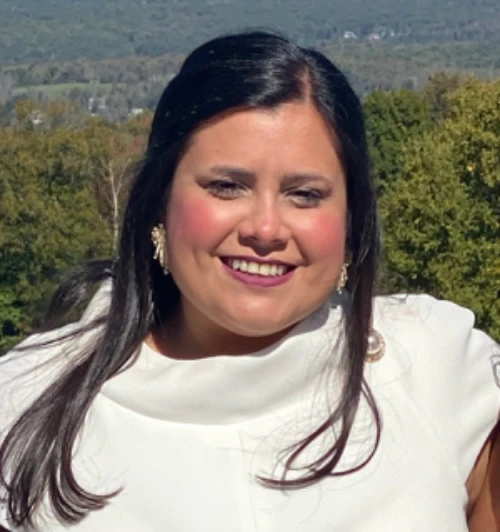Katie Richardson Engles
How a Psychology Degree Provided the Best Foundation for a Career in Law
Jan 09, 2022
Katie Richardson Engles, Esq., a Scranton native, graduated from Marywood University in 2015 with a Bachelor’s degree in Psychology and a minor in Criminal Justice. After graduation, she moved on to study law at Widener University Commonwealth Law School in Harrisburg, Pa. She graduated from Widener in 2018, and today she works under Judge Margaret A. Bisignani Moyle as a law clerk in the Lackawanna County Court of Common Pleas, Scranton. However, you may be surprised to learn that some of the most important classes she took at Marywood weren’t for her major. We recently spoke to Katie about her experiences at Marywood, and how they’ve impacted her beyond graduation.
Why did you choose Marywood?
I actually didn't go to Marywood at first; I started out at Temple University, but that environment just wasn’t good for me. It was a lot of large classes, so the professors couldn’t really give you individual attention. I decided the fit wasn’t right, and, after two years, I decided to come back home and transfer to Marywood.
What did you like better about Marywood?
Marywood is a much smaller school, so you felt like you really knew all of your professors and that they were there to help you, which was especially important when preparing for the LSATs. Plus, the smaller class sizes not only helped me to be more competitive when applying to law school, but it made me much more competitive, because I had friends pushing me to do my best.
Did you change your major when you came to Marywood, or did you stay with the same major you were in at Temple?
I switched from History with a minor in Criminal Justice to Psychology with a minor in Criminal Justice. I liked history, but the more I thought about it, it seemed like having a background in psychology would help me in a law career, because it’s all about understanding people. Even working as a law clerk now, I think I made the right call.
Were you involved in any extracurricular activities at Marywood?
Yes, I was part of the Psychology Club, and Psi Chi, the Psychology Honor Society. I also worked on campus with residents at the Our Lady of Peace Residence. I was a commuter, but I was always on campus anyway.
What were some of your favorite classes you took at Marywood?
I really enjoyed taking Developmental Psychology with Sister Gail Cabral—she was fantastic. I also really liked taking Constitutional Law with Dr. Jackson, because it was pretty challenging, especially coming from another major. Many of the writing classes I took were very beneficial for me too, because I’m constantly reading and writing at my job. Writing well is probably the single most important thing I learned to do. To this day, Judge Moyle continues to correct papers that I write—it’s very similar to being in school.
What was the most challenging part of college, and how did you overcome it?
Honestly, I think the hardest thing to deal with was living with my parents. It’s difficult to study at home. My mom, especially, was always hounding me to do my work or trying to hold a conversation when I was in the middle of homework. I ended up having to leave to do work on campus or at some local coffee shops, but I made do.
What did you miss about Marywood after graduation?
What I missed most about the university after graduation, besides my friends and the teachers I met along the way, was the pace of everything at Marywood. At Marywood, if you’re struggling you have resources and teachers who are willing to slow things down, so you can take it at your own pace. It wasn’t like that at all when I got to law school: you either kept up with your professors or you fell behind. It was very different and really made me wish I was back at Marywood.
How did Marywood prepare you for your life after college?
Marywood really instilled in me a desire to help people; it’s like a bug you catch when you go here. That’s extended to my job, of course, but I also help organize food drives for my area as a board member for Friends of the Poor. It could be something that endures from college, but I really like to keep busy, and I never want to be idle if I can help it.
What is a typical day like at your job?
A lot of phone calls each day. We spend a lot of time working with domestic violence cases and scheduling things with lawyers. I also assist the Judge in researching and writing her opinions on various topics.
What is your favorite part of your job?
I really love the experience of working with people and helping them. Not only does it make me feel good, but also, I feel like it’s preparing me to practice law after this job.
How do you account for your success?
I’ve had a lot of great, hard-working people in my life to keep motivating me. My parents are the hardest working people I know. They’ve been working through this entire pandemic, and they instilled that same work ethic in me. My friends and I always kept pushing each other to do better and better. And, of course, my husband, who encourages me to keep moving forward every day.
What are your plans for the future?
After the pandemic is over, I plan to start practicing law on my own, and, years from now, my end goal is to become a judge myself.
